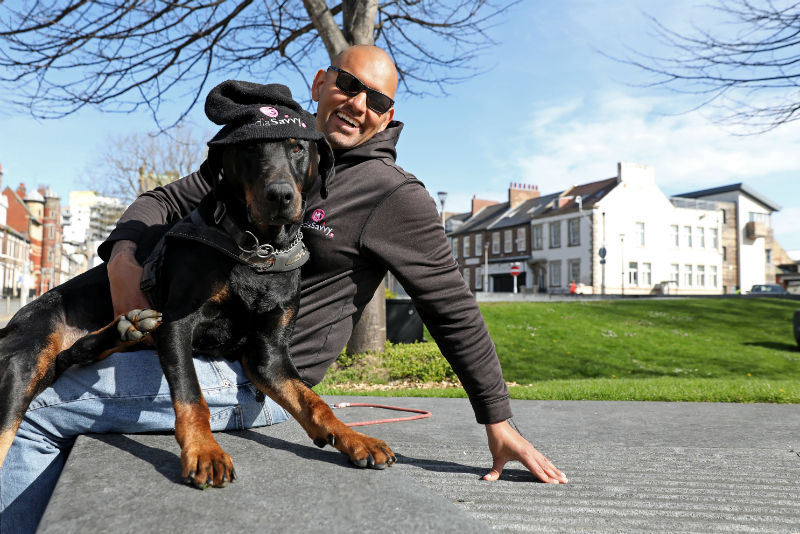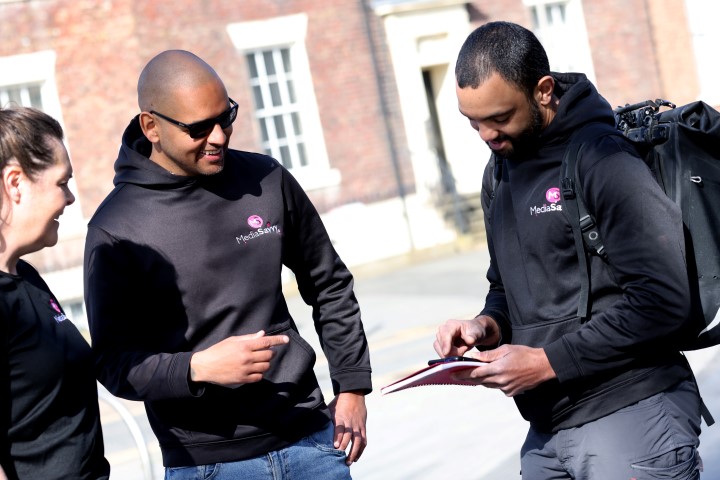
In 2010, Dan Makaveli co-founded Media Savvy CIC, an award-winning social enterprise which has been making a big difference to individuals living on society’s margins since its humble beginnings.
Named the Outstanding Social Enterprise at the 2020 North East Charity Awards, the core purpose of the CIC is to provide education, employability skills, creativity and opportunities for recovery and rehabilitation for some of society’s most disadvantaged people.
Meanwhile, a separate arm of the business specialises in delivering high quality creative projects to companies UK-wide, the proceeds of which are reinvested in its core purpose.
Media Savvy’s vision is “a society where each individual feels valued, has access to suitable education and the opportunity to realise their potential.” Dan says: “I believe in being genuine, being empathetic and putting strong values at the forefront of all you do, whether you’re a social enterprise or a profit-making company.”
How did Media Savvy come about? My business partner Mark McKenna and I had both worked for creative businesses in the same office space and the opportunity to work on a video, animation and graphics project to promote social inclusion in a deprived area of County Durham came up. The project went well and we both got a lot out of it, so the idea for Media Savvy came from that. Our idea was to provide informal creative workshops and short courses towards qualifications in visual arts and media for people marginalised in society.
We evolved to add workshops in wellbeing, health and nutrition, and to fund our work by offering commercial services in areas such as animation and graphic design. We have a team of videographers, designers, illustrators, web/app developers, animators and even personal trainers delivering services to commercial clients, and the profit from that work is reinvested in our social purpose.
Who do you help? Our beneficiaries may be diagnosed with a serious mental illness, while some have a learning disability and/or autism. They may have physical health issues or maybe a negative history with the criminal justice system. One or a combination of these factors may have contributed towards keeping them out of the workforce for a long time. The vast majority of our learners are desperate to learn new skills and make a positive contribution to society, and it’s our job to help them do that.
To take one example of a long-standing client who sadly died recently, we first met him after he was referred to our service by his occupational therapist (OT), to be part of a course we were delivering in partnership with CNTW at the old Cherry Knowle hospital site. He was someone unlikely to ever be (clinically) really well, but he engaged with us consistently over the years and we’re told that the positive engagement we provided at times saved him from being sectioned. We worked closely with him and his OT, and he even went on to successfully mentor other people.

What inspires you? People do, and the way they can come together to make change happen. People tell us that our support has saved their lives, and while we would never claim that, we are part of a process that truly and deeply helps them. Most people are a pleasure to work with, and the more they engage with us, the more they need, the more we are happy to give. All our team are onboard with our organisational culture, which means they are always there for people, happy to reply to messages over the weekend and out of hours. That commitment allows us to make a genuine impact and we see some real transformations in people who come to us at their lowest ebb and go on to make a new life. This culture is what really sets us apart and is something I sincerely believe can only ever work if it’s organic, inherent, and genuine.
How have society’s attitudes changed in the years since you began? Back when we started there was a real stigma around mental health, especially in men. The stigma is not so bad these days, but over the last couple of years we’ve seen a further overall decline in mental health due to the pandemic and the isolation it has caused. Today, these issues are talked about more, which is a positive, though the one thing that hasn’t improved, and which we’re trying to have a direct impact on, is sustainable employability.
So, in addition to our courses and workshops, we’re now planning to open a café bar and events space at our offices in Sunniside. Called Diego’s Joint, it will help to provide more direct employability skills. It’s a big project which has been almost three years in the making, and we’re on the verge of making it happen. Diego’s Joint will provide training, voluntary positions and permanent employment opportunities for people on whom no-one else will take a chance. I can’t tell you how many references we’ve completed or how many letters of recommendation we’ve written for our learners over the years, and if this new project can help people into meaningful and permanent work, that will be fantastic. Part of it is about building positive networks so we can become known as a supplier of employees for various sectors, because with us they will develop transferrable as well as job-specific skills.
What can we all learn from what you do? Empathy is at the heart of what we do, and resilience is key. There have been many challenges along the way, particularly in the first two or three years when we worked incredibly hard to get established, rarely able to take a wage. At the time, this commitment to our mission certainly helped to demonstrate that we are here for the right motivations and will be there even when there’s no money. I believe in being genuine, being empathetic and putting strong values at the forefront of all you do, whether you’re a social enterprise or a profit-making company. In fact, I know a lot of profit-making companies that are really socially committed, which is great. Consumers are also becoming a lot more conscious in their purchasing decisions, and that’s making a positive difference to how companies operate.
What would you like to see change in Sunderland in the next few years? Well, I’ve lived in the city since the early 2000s, and I’ve seen a lot of change over that period. In my opinion, the last five years have been the best in terms of strategy and investment for the area and I’d like to see that continue. I’d also like to see the voluntary sector taken more seriously, and the creative sector supported to grow and develop.
What lies behind the success of your enterprise? The two biggest things for me must be the organisational culture and the staff. Everyone buys into our culture and the team have been in it for the long-haul because we believe in the work we’re doing and the deep impact we all help to make happen. There have been some tough challenges over the years, but we’ve been able to ride them out, and we will again, because we believe we’re going in the right direction and that we will get there together.